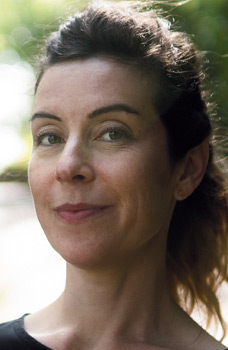
Jackie Polzin talks about her debut novel, Brood, and how her own experience caring for chickens contributed to it.
First of all, why chickens?
When I was 30, my partner and I got chickens. They were my first pets since childhood. I compensated by giving them a lot of attention, and that attention inspired the book. I knew I could spend time with the ideas the chickens provoked. Some broad ones: that a chicken's egg-heavy existence seldom bears new life; that a chicken is a pet whose value is complicated by its utility, often thought of as less-than when it stops laying eggs; that caring for a chicken yields very little emotional feedback. These ideas aren't stated directly but they're part of the story and quite specific to chickens.
What made you decide to leave the narrator unnamed?
Grief is an isolating force in the story. The narrator is coming to terms with the loss of an identity she had imagined for herself, facing the likelihood she will never be a mother. So it felt natural to write the book this way, from inside the narrator's world. My working title for the book was The Chicken Diaries. It provoked a lot of laughter; I think people imagined the chickens themselves keeping diaries. But it worked for me, as a reminder of how the story operates, close to the narrator's present moment and thinking.
Brood has some things in common with recent autofiction. To what extent was this story autobiographical for you?
The initial premise is true. I struggled with infertility for many years and in the midst of that I had a miscarriage. We raised chickens during that time. My preoccupation with infertility filtered my experience with the chickens. The book probably wouldn't have come into being without that state of mind. When I first summarized the story for my mom, I concluded, "so there's obviously aspects of the story that are from my life," to which she responded, "I'll say."
The narrator and her husband, Percy, live in Minnesota, but by the end they are preparing for a move to California. How did you intend for dichotomies like Midwest/West Coast and rural/urban (keeping chickens, but in a slightly rough part of a city) to shape the narrative?
Raising chickens within city limits comes with a lot of constraints, and changes a person's relationship to the city. I like the idea that living in a different place or taking on a new role in the same place yields a shift in perspective, and might reveal an aspect of a person's character that was previously diminished or unexplored.
Stereotypes of pet owners and their "fur babies" (doting "cat mom" here!) can make it seem like keeping animals is a poor substitute for having children. What emotional truths did you hope to convey through the relationships between humans and animals in the novel?
I think care is valuable, pretty much wherever it's directed. "Fur babies" and "cat moms"—I don't know the equivalent terms for completely committed chicken owners. Maybe because people are more likely to attribute human qualities to pets that occupy their private space; I don't know anyone whose chickens sleep in their home. The notion of mothering is possibly more of a stretch with chickens. I'm interested in that stretch.
This passage struck me: "Percy and I do eat chicken. The chickens of the system, whose lives bear almost no resemblance to life at all. It is horrible to think of eating chickens with such horrible lives, which is why we don't think much about it." For the narrator and for us in general, what other aspects of life go unconsidered because we can't face the implications?
There's a moment when the narrator is overcome with relief that the chickens have survived and she almost convinces herself the chickens are invincible. This moment, and many others, relate to a central plight of motherhood: awareness of mortality, and having to live each day alongside that fact. Generally, we're conditioned to shut our minds to everyday horror and the suffering of others to protect ourselves from the real suffering we feel via consideration. It's a completely understandable mode of operation, but not free of consequence. I think caring outside our comfort zones is the great challenge of our time.
What's the next project for you, writing or otherwise?
I have a few longer projects in the works. I move back and forth between them. My sister and I were planning to collaborate on a graphic novel this spring during her sabbatical. She's a painter, and a role model for me—quietly, consistently doing her work. But we both have young kids at home. Neither of us has mentioned the project since the pandemic began. It exists only as the wonderfully crass title she pitched to me.
Interview by Rebecca Foster. Copyright BookBrowse 2021
Unless otherwise stated, this interview was conducted at the time the book was first published, and is reproduced with permission of the publisher. This interview may not be reproduced or reprinted without permission in writing from the copyright holder.
Censorship, like charity, should begin at home: but unlike charity, it should end there.
Click Here to find out who said this, as well as discovering other famous literary quotes!
Your guide toexceptional books
BookBrowse seeks out and recommends the best in contemporary fiction and nonfiction—books that not only engage and entertain but also deepen our understanding of ourselves and the world around us.